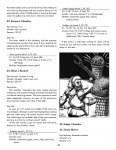Maybe a step back is in order. Most of the objections seem to revolve around the idea that the five encounter, four-person party is baked in you either should live with it and find ways to bend your story to fit, or find a different game. But Capn's earlier arguments were about ways to "fix" the game that didn't (presumably) prevent a four-person party having five encounters per day.
What this thread is devolving into (I fear) is a lot of people arguing abstract principles at each other. Which is an argument that can never be won. Only factual arguments can be won. I would suggest if Capn wants to refute the people who claim his objections are not design flaws but core assumptions of the game, he provide some examples of how the game or its content (I separate out the two) could be changed such that it solves a problem but doesn't interfere with what others say are design goals. If he can give examples of changes that remove constraints but don't add new ones, then he proves his point. If others can show that the proposals do in fact interfere with what they say are actually design goals, then they prove theirs.
For example, the Jubilex monster change where the spawning feature prevented a PC party insta-winning but without ramping up its ability to do damage per se. I.e. it reduced swinginess but didn't make the monster tougher as such.
Maybe Capn or another could give specific examples (let's number them so they're easy to discuss) if they're willing and discussion could become more concrete, and thus more likely to produce actual conclusions as to whether the game can be improved without diminishing the fun of people who are already happy. It would certainly be more useful to people like myself who could decide whether a suggestion would be good to add to their own game.
Just a thought.
What this thread is devolving into (I fear) is a lot of people arguing abstract principles at each other. Which is an argument that can never be won. Only factual arguments can be won. I would suggest if Capn wants to refute the people who claim his objections are not design flaws but core assumptions of the game, he provide some examples of how the game or its content (I separate out the two) could be changed such that it solves a problem but doesn't interfere with what others say are design goals. If he can give examples of changes that remove constraints but don't add new ones, then he proves his point. If others can show that the proposals do in fact interfere with what they say are actually design goals, then they prove theirs.
For example, the Jubilex monster change where the spawning feature prevented a PC party insta-winning but without ramping up its ability to do damage per se. I.e. it reduced swinginess but didn't make the monster tougher as such.
Maybe Capn or another could give specific examples (let's number them so they're easy to discuss) if they're willing and discussion could become more concrete, and thus more likely to produce actual conclusions as to whether the game can be improved without diminishing the fun of people who are already happy. It would certainly be more useful to people like myself who could decide whether a suggestion would be good to add to their own game.
Just a thought.

